专题01 Units 1~4 单词,短语,重点句式课件【期中考点大通关】2024-2025学年八年级英语上学期(沪教牛津版)
文档属性
| 名称 | 专题01 Units 1~4 单词,短语,重点句式课件【期中考点大通关】2024-2025学年八年级英语上学期(沪教牛津版) |

|
|
| 格式 | pptx | ||
| 文件大小 | 2.0MB | ||
| 资源类型 | 试卷 | ||
| 版本资源 | 牛津深圳版 | ||
| 科目 | 英语 | ||
| 更新时间 | 2024-10-22 10:24:11 | ||
图片预览

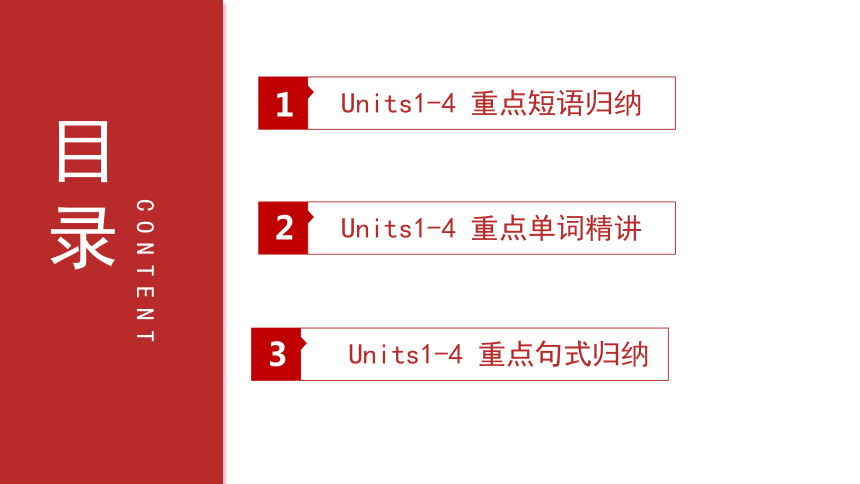

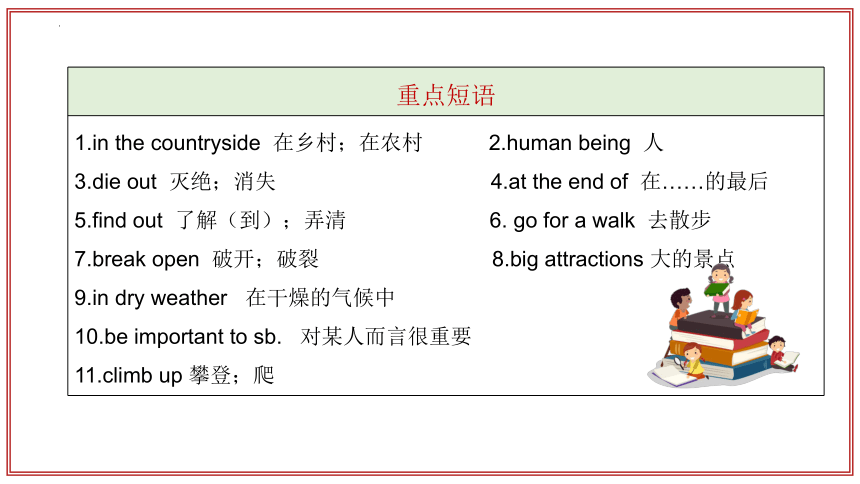

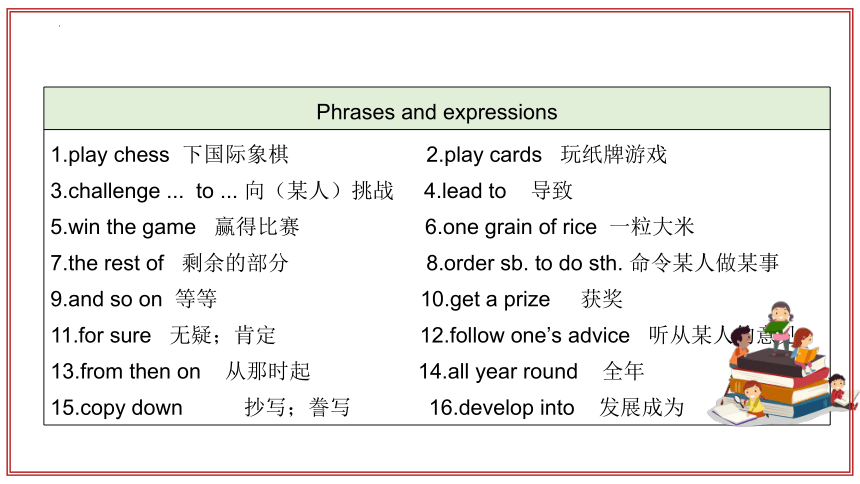


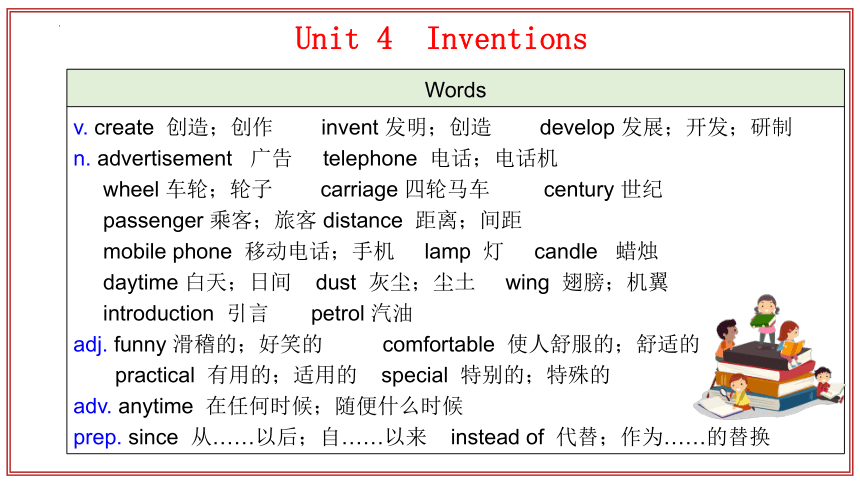
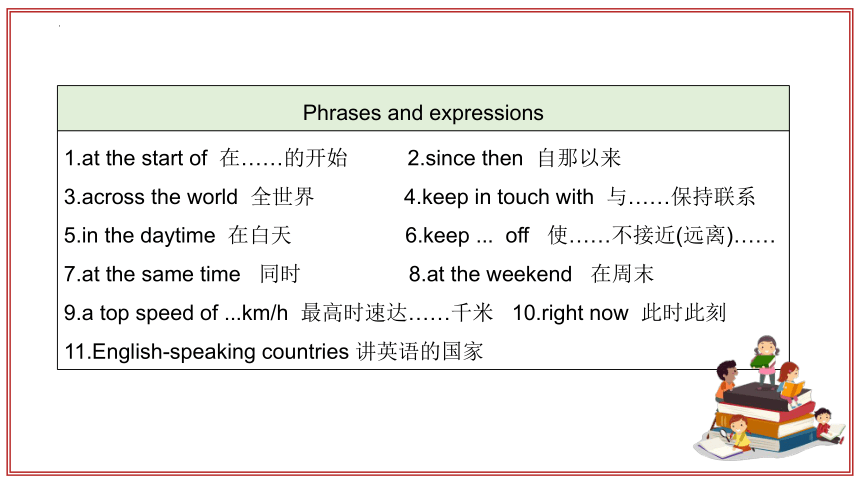


文档简介
(共36张PPT)
牛津版八年级上期中考点串讲
Units 1-4
重点单词,短语,句式精讲
目
录
CONTENT
Units1-4 重点短语归纳
Units1-4 重点单词精讲
Units1-4 重点句式归纳
2
3
1
Words
v. born(be born) 出生 include 包括;包含
win(won, won)(在比赛中)获胜,赢
n. dinosaur 恐龙 inventor 发明家 musician 音乐家
scientist 科学家 countryside 乡村;农村
intelligence 才智;智慧 ability 才能,能力 invention 发明
notebook 笔记本 dollar 元(美国、加拿大等国货币单位)
adj. human 人的
adv. perhaps 可能;大概 even (强调出乎意料)甚至
however 然而 suddenly 突然;忽然
pron. nobody 没有人
Unit 1 Encyclopedias
重点短语
1.in the countryside 在乡村;在农村 2.human being 人
3.die out 灭绝;消失 4.at the end of 在……的最后
5.find out 了解(到);弄清 6. go for a walk 去散步
7.break open 破开;破裂 8.big attractions 大的景点
9.in dry weather 在干燥的气候中
10.be important to sb. 对某人而言很重要
11.climb up 攀登;爬
Words
v. check 检查;核实 challenge 向(某人)挑战
promise 许诺;承诺 double (使)加倍
realize 认识到;意识到 copy 抄写;誊写
n. number 数字 instructions 指示;命令 gram 克
son 儿子 chess 国际象棋 India 印度 prize 奖赏;奖品
grain 谷粒 chessboard 国际象棋棋盘 amount 数量;数额
rest 剩余部分 gold 金子;黄金 traffic 交通
accident (交通)事故
adj. wise 充满智慧的
adv. instead 代替;顶替 correctly 准确无误地;正确地
Unit 2 Numbers
Phrases and expressions
1.play chess 下国际象棋 2.play cards 玩纸牌游戏
3.challenge ... to ... 向(某人)挑战 4.lead to 导致
5.win the game 赢得比赛 6.one grain of rice 一粒大米
7.the rest of 剩余的部分 8.order sb. to do sth. 命令某人做某事
9.and so on 等等 10.get a prize 获奖
11.for sure 无疑;肯定 12.follow one’s advice 听从某人的意见
13.from then on 从那时起 14.all year round 全年
15.copy down 抄写;誊写 16.develop into 发展成为
Words
v. compare 比较;对比 type 打字 control 控制;操纵
depend 依靠;依赖 operate 操作;控制
sell (sold, sold)出售;售卖
n. order 订货;订购 monitor 显示器 speaker 扬声器
main unit 主机 keyboard 键盘 mouse 鼠标 brain 脑
speed 速度 railway 铁路系统 company 公司 price 价格
total 总额;合计 inch 英寸
adj. expensive 昂贵的;价格高的 tiny 极小的;微小的
popular 受喜爱的;受欢迎的
Unit 3 Computers
重点短语
1.Work as从事…工作 2.(be)unaware of没意识到;未察觉
3.depend on依靠 4.in addition除……以外(还)
5.one day总有一天;有朝一日 6.be able to能够
7.happen to.发生在…身上 8.grand total总计;共计
9. stop sb. from doing sth阻止某人做某事
10.look forward to(doing)sth.盼望(做)某事
11. be short of 缺乏;缺失
12. in the 1940s 在20世纪40年代
13 at a faster speed 以更快的速度
Words
v. create 创造;创作 invent 发明;创造 develop 发展;开发;研制
n. advertisement 广告 telephone 电话;电话机
wheel 车轮;轮子 carriage 四轮马车 century 世纪
passenger 乘客;旅客 distance 距离;间距
mobile phone 移动电话;手机 lamp 灯 candle 蜡烛
daytime 白天;日间 dust 灰尘;尘土 wing 翅膀;机翼
introduction 引言 petrol 汽油
adj. funny 滑稽的;好笑的 comfortable 使人舒服的;舒适的
practical 有用的;适用的 special 特别的;特殊的
adv. anytime 在任何时候;随便什么时候
prep. since 从……以后;自……以来 instead of 代替;作为……的替换
Unit 4 Inventions
Phrases and expressions
1.at the start of 在……的开始 2.since then 自那以来
3.across the world 全世界 4.keep in touch with 与……保持联系
5.in the daytime 在白天 6.keep ... off 使……不接近(远离)……
7.at the same time 同时 8.at the weekend 在周末
9.a top speed of ...km/h 最高时速达……千米 10.right now 此时此刻
11.English-speaking countries 讲英语的国家
二、重点单词
要点1 look up 查,查找
look up是由动词+副词构成的短语,如果宾语是代词,要放在look与up之间,如果是名词,可放在look up后面,也可以放在look与up之间。
【拓展】 与look有关的常用短语:
look out look through
look over look after
look forward to look like
look for look out of
【典例分析】
1.—What’s the meaning of “One Belt and One Road”
—Let me _____ the words in the new dictionary.
A. look at B. look for C. look after D. look up
【答案】D用短语辨析法解题。look at 看……;look for 寻找;look after 照顾;look up 查找。结合句意可知,“在词典中查找单词”。
要点2 inventor
【典例分析】
1.这位科学家发明了许多东西,他最重要的一项发明是电灯泡。。
The scientist_________ many things,his most important __________ was the light bulb.
invented invention
要点 3
as…as… 意为“和……一样……”,表示同级比较。常用基本结构为:
as + adj. / adv. + as, 其否定结构为:
not as / so + adj. / adv. + as
【典例分析】
1.这部电影和那部电影一样有趣。
This film is ______ _______ ______ that one.
2.这本字典没有那本字典厚
This dictionary isn’t _____ ______ _______ that one.
as interesting as
so/as thick as
要点 4 辨析die,death,dying 和dead 的用法区别。
die 是动词“死,死亡”,
death 是名词“死,死亡”。
dead 是形容词“死的”。
dying是形容词“快死的,垂死的”。
【典例分析】
用die,death,dying,dead的正确形式完成句子:
1.He in 1989 at the age of 76.
2.Two children were burnt to in the fire.
3.The man was already when the other people found him.
4.There is a lion in the zoo.
died
death
dead
dying
要点 5:check
check及物动词,意为“检查;核实”。
Our teachers check our homework every day.
我们的老师们每天给我们检查作业。
Please check the answers.请核实答案。
拓展:check 的相关短语:
Check in登记;检票 check out办请手续后离开 check up检查
【典例分析】
1.用单词填空
You’d better c_____ your answers carefully before handing in your paper.
Check
要点 6:promise
promise用作动词时,意思是“许诺”
用作名词,意思是“诺言, 希望, 约定”
常用短语: promise sb. sth 承诺给某人某物 promise that +从句 承诺 ......
promise to do sth. 承诺做某事 make a promise(to do) 许下承诺,保证
【典例分析】
1.我爸爸承诺买一部新自行车给我作为生日礼物。
My father _______ ______ _____ me a new bike as a birthday present.
2.当我们向别人许下诺言时,我们就应该去遵守它。
When we_______ ______ ______ to others, we should keep it.
promised to buy
made a promise
要点 7 rest
rest 用作名词时,意为“剩余”;
用作动词时,意为“休息”
用作名词时,意为“休息”
常用短语:the rest of 剩余的...... have a rest 休息一下
【典例分析】
1 剩下的日子我们该怎么过?
How should we spend _______ ______ _____ ________
2 工作之余你应该休息一下。
You should ______ ____ _____ after the work.
the rest of days the rest
have a rest(break)
要点 8:challenge
challenge用作名词时,意思是“挑战” 用作动词时,意思是“挑战”
常用短语: accept a challenge 应战
challenge sb to 挑战某人做某事
【典例分析】
1.他向我挑战下象棋。(完成句子)
He______________ me ______________ chess.
challenges to
要点 9:lead to
(1) (道路)等通往……。 (2) 引起(结果等);导致。
(3)lead sb to some place 把某人带到某地lead sb to do sth 带领某人做某事
【典例分析】
1. 过量的工作和过少的休息会引起疾病。
Too much work and too little rest often _______ ______ illness.
2. 这条街能直通动物园吗
__________ this street _________ right __________the zoo
leads to
Does lead to
要点 10:happen
happen:指计划之外的“偶然发生”;
take place:指计划,安排之内的发生
短语区分:Sth. + happen to sb:表示“某人发生了某事”
Sb + happen to do sth:表示“某人碰巧发生了某事”
【典例分析】
1.昨天他发生了车祸。(翻译句子)
A car accident happened to him yesterday.
2.10年来我们的家乡发生很大的变化。(翻译句子)
Our hometown has taken place a lot in the past 10 years
要点 11:order
order n. 订货;订购
1)We were producing your order. 我们正在做你们的订单。
2)We will finish your order as soon as possible. 我们将尽快完成您的订货。
order还可作动词,意为“订购;点食物”的意思。
1)He ordered a gift for his friend on the Internet.
他在网上为他朋友定购了一份礼物。
in order to do sth 为了做某事
give orders 发出指示;给出命令 in order 整齐;状况良好
out of order 出故障;不整洁 order sb to do sth 命令某人干某事
in order to do sth 为了做某事
【典例分析】
一、写出下列画线单词的词性及汉语意思。
1.The police ordered them to wait right there.
【答案】动词,命令。
2.He ordered a cup of coffee
【答案】动词。订购,点(菜)
3.He got up early in order to catch the early bus.
【答案】为了做某事。
4.You can order those books on the Internet very quickly.
【答案】order 订购之意,动词。你可以很快在网上订购这些书。
5.The boss placed an order for 100 trucks.
【答案】order 名词 订单。 place an order 下订单。固定搭配。老板下了100卡车的订单。
要点 12 stop
(1)stop doing sth.表示“停止做某事”,doing是stop的宾语,是要停止的动作。
(2)stop to do 表示“停下来开始做某事”, to do是stop的状语,表示目的,是要开始做的事情。
(3)stop …from 表示阻止。。。做某事
【典例分析】
1. You look tired, you must________.
A. stops to work B. stopped working C. stop to work D. stop working
2. In the end, we felt tired, so we stopped ______ a rest.
A. having B. to have C. had D. have
D
B
要点13 compare
compare…with…与compare…to…的区别
compare用作动词“比较,对比,比作”。常用短语:
“compare with”表示“把……和……相比”,表示同类人或事物相比较,是指研究评判人与人之间、事
物与事物之间相同或相异的程度;
(2)“compare to 表示“比喻为……”,是指出两者之间的关系相似,常表示不同类人或事物相比作、比拟,意味着两种事物有共同之处。如:
He compared his camera with mine.他把他的照相机跟我的比较。
We often compare a teacher to a candle. 我们常把老师比喻成蜡烛。
(3) compared with/to...意为“和……相比”,该短语通常要求与其他词语组成独立状语,放在句首。如:
Compared with/to other cities, I think Guilin is more beautiful.
和其他城市相比,我认为桂林更漂亮。
【典例分析】
1.请不要老是拿我和别人作比较!
Do not always __________ me __________ others, please!
【答案】compare with 表示“把……和……相比”,表示同类人或事物相比较.
2.他们都开始把他比作雷锋。
They all started to __________ him __________ Lei Feng.
【答案】compare to “compare to 表示“比喻为……”,是指出两者之间的关系相似,常表示不同类人或事物相比作
要点14 depend
1)depend v.视……而定;决定(于)
Whether we start or not depends on the weather.
我们是否开始取决于天气。
2)常用短语depend on意为“依靠”,后接名词或代词,它的主语可以是人也可以是物,但含义不同。
人+depend(s) on(依靠);物+depend(s) on(视……而定)。
The old man depends on his son. 那位老人依靠他的儿子。
Our plan depends on time. 我们的计划取决于时间。
要点15 since
since的用法
(1)作为介词,意为“自……以来”,后接时间点作时间状语,常用于现在完成时,可以和“for + 时间段”互换。
I have known him since 10 years ago.自从10年前我就认识他了。
= I have known him for 10 years.我认识他已经有10年了。
(2)作为连词,意为“自……以来”,引导时间状语从句,主句常用现在完成时,从句常用一般过去时。(3)作为连词,还可译为“由于;既然”,引导原因状语从句,表示很明显的原因。
1.It’s almost eight years we saw each other last time.
A since B. before C. after D. when
【答案】A
【解析】句意:自从我们上次见面以来已经快八年了。
考查连词辨析。A. since自从……以来;B. before在……之前;C. after在……之后;D. when当……时候。本句为固定用法,即It’s +一段时间 +since +一般过去时态的句子。故选A。
2.—How long have you lived here
—________ about 5 years ________ my family moved to the city.
Since; for B. For; since C. For; for D. Since; since
【答案】B
【解析】句意:——你住在这里有多长时间了?——自从我家搬到这座城市有五年了。考查介词、连词辨析。since自从,可以作介词或者连词,引导时间状语从句;for介词,后面可跟一段时间。作连词时可以引导原因状语从句。第一个空后about 5 years是名词短语,表示一段时间,故用介词For;第二个空后是一个从句,表示时间,应用since引导。故选B。
要点16 create
create v. 创造;创作
Write a short article about a new invention that you will create. 写一篇短文,描述你将创造的一个新发明。
【拓展】
creation 创造物 ,作品n
creator 创造者 n
creative 有创造力的adj
creativity 创造力 n
The creator created the creation. He is creative.
这个创造者创作了这个作品,他很有创造力
要点17 practical
practice作动词,意为“练习,实践”。既可以作及物动词,又可以作不及物动词。其后可以接名词、代词或动词-ing形式。【注意】也可以做名词,practice为不可数名词。例如:
practise 只做动词,作动词用法与 practice同
Do you often practice playing football after school? 你经常放学后踢足球吗?
【典例分析】
1.Your invention is very _____________.
2.She practised _____(play) the piano in the primary school basement.
3.She was taking her daughter to basketball ______________ every day.
4.__________ experience is often very important.
practical
playing
practice
Practical
要点18 develop
develop v. 开发;研制
Thomas Edison developed the first practical light bulb in 1879. 托马斯·爱迪生在1879年研制了第一个有用的电灯泡。
【拓展】
developed 发达的 developing 发展中的
Canada is a developed country. 加拿大是一个发达国家。
China is a developing country. 中国是个发展中国家。
【典例分析】
1.Will they ____________ their own machines
2.____________ of new energy takes time.
3.China is a socialist country, and a ____________ country as well.
4.Britain is a modern, ____________ country.
develop
Development
developing
developed
Unit 1 Useful sentences
1.From an early age, he showed great intelligence and artistic ability.
他从小就表现出很高的智力和艺术能力。
2.As he grew older, ...随着年龄的增长。。。
3.Dinosaurs lived on Earth more than 60 million years before human beings.
恐龙比人类早6000多万年生活在地球上。
4.They lived everywhere on Earth.他们生活在地球上的任何地方
5.Some dinosaurs were as small as chickens. Others were as big as ten elephants.
有些恐龙像鸡一样小。其他的有十头大象那么大。
6.It just takes hard work and ...这需要努力工作。。。
7.It’s always useful to have an encyclopaedia around the house.
家里有一本百科全书总是有用的。
8.It’ll be a great help with your studies.这对你的学习会有很大的帮助
9.The idea worked.这个想法奏效了。
Unit 2 Useful sentences
1.The king promised the old man, “You can have any prize if you win the game.”
国王答应老人:“如果你赢了这场比赛,你可以得到任何奖品。
2.Is that all 就这些吗?
3.Wouldn’t you like gold or silver instead 你不喜欢黄金还是白银?
4.Can I check them with you 我可以和你核对一下吗?
5.However, they could only count small numbers in this way.
然而,他们只能用这种方式计算小数字。
6.They often put the tokens on pieces of string so that they could carry them around easily.
他们经常把代币放在绳子上,这样他们就可以很容易地随身携带。
Unit 3 Useful sentences
1.Now computers are becoming smaller and better. 现在电脑越来越小,越来越好。
2.You depend on computers more than you realize.你对电脑的依赖比你意识到的要多。
3.Your brain can produce new ideas but computers cannot.
你的大脑可以产生新想法,但电脑不能。
4.Computers may change our lives, but will they make them better
电脑可能会改变我们的生活,但它们会让生活变得更好吗?
5... is probably a better choice for you.对你来说可能是个更好的选择。
6.I look forward to your reply.我期待你的答复。
7.In the past, students used to play outside more often, but now they spend more time in front of computers.过去,学生们经常在外面玩,但现在他们花更多的时间在电脑前。
8.They’ll also give some advice on how to use computers for studying.
他们还将就如何使用电脑学习提供一些建议。
9.I hope we can all work together to ...我希望我们能共同努力。。。
10.Thank you for your time.感谢您抽出时间。
Unit 4 Useful sentences
1.Great inventions change the world.伟大的发明改变了世界。
2.The wheel is perhaps the greatest invention in history.轮子也许是历史上最伟大的发明。
3.They allow people to keep in touch with each other anytime, anywhere.
他们允许人们随时随地保持联系。
4.With light bulbs, people can do as many things in the evenings as they can in the daytime.
有了灯泡,人们可以在晚上和白天做尽可能多的事情。
5.Can you imagine living without them 你能想象没有它们的生活吗?
6.What is the most useful invention to you and your family
对你和你的家人来说,最有用的发明是什么?
7.What is special about it 它有什么特别之处?
8.You will be as free as a bird.你会像鸟儿一样自由。
9.The ballpoint pen was a great success.圆珠笔大获成功。
10.People will always remember ... for his invention.
人们会永远记住。。。为了他的发明。
牛津版八年级上期中考点串讲
Units 1-4
重点单词,短语,句式精讲
目
录
CONTENT
Units1-4 重点短语归纳
Units1-4 重点单词精讲
Units1-4 重点句式归纳
2
3
1
Words
v. born(be born) 出生 include 包括;包含
win(won, won)(在比赛中)获胜,赢
n. dinosaur 恐龙 inventor 发明家 musician 音乐家
scientist 科学家 countryside 乡村;农村
intelligence 才智;智慧 ability 才能,能力 invention 发明
notebook 笔记本 dollar 元(美国、加拿大等国货币单位)
adj. human 人的
adv. perhaps 可能;大概 even (强调出乎意料)甚至
however 然而 suddenly 突然;忽然
pron. nobody 没有人
Unit 1 Encyclopedias
重点短语
1.in the countryside 在乡村;在农村 2.human being 人
3.die out 灭绝;消失 4.at the end of 在……的最后
5.find out 了解(到);弄清 6. go for a walk 去散步
7.break open 破开;破裂 8.big attractions 大的景点
9.in dry weather 在干燥的气候中
10.be important to sb. 对某人而言很重要
11.climb up 攀登;爬
Words
v. check 检查;核实 challenge 向(某人)挑战
promise 许诺;承诺 double (使)加倍
realize 认识到;意识到 copy 抄写;誊写
n. number 数字 instructions 指示;命令 gram 克
son 儿子 chess 国际象棋 India 印度 prize 奖赏;奖品
grain 谷粒 chessboard 国际象棋棋盘 amount 数量;数额
rest 剩余部分 gold 金子;黄金 traffic 交通
accident (交通)事故
adj. wise 充满智慧的
adv. instead 代替;顶替 correctly 准确无误地;正确地
Unit 2 Numbers
Phrases and expressions
1.play chess 下国际象棋 2.play cards 玩纸牌游戏
3.challenge ... to ... 向(某人)挑战 4.lead to 导致
5.win the game 赢得比赛 6.one grain of rice 一粒大米
7.the rest of 剩余的部分 8.order sb. to do sth. 命令某人做某事
9.and so on 等等 10.get a prize 获奖
11.for sure 无疑;肯定 12.follow one’s advice 听从某人的意见
13.from then on 从那时起 14.all year round 全年
15.copy down 抄写;誊写 16.develop into 发展成为
Words
v. compare 比较;对比 type 打字 control 控制;操纵
depend 依靠;依赖 operate 操作;控制
sell (sold, sold)出售;售卖
n. order 订货;订购 monitor 显示器 speaker 扬声器
main unit 主机 keyboard 键盘 mouse 鼠标 brain 脑
speed 速度 railway 铁路系统 company 公司 price 价格
total 总额;合计 inch 英寸
adj. expensive 昂贵的;价格高的 tiny 极小的;微小的
popular 受喜爱的;受欢迎的
Unit 3 Computers
重点短语
1.Work as从事…工作 2.(be)unaware of没意识到;未察觉
3.depend on依靠 4.in addition除……以外(还)
5.one day总有一天;有朝一日 6.be able to能够
7.happen to.发生在…身上 8.grand total总计;共计
9. stop sb. from doing sth阻止某人做某事
10.look forward to(doing)sth.盼望(做)某事
11. be short of 缺乏;缺失
12. in the 1940s 在20世纪40年代
13 at a faster speed 以更快的速度
Words
v. create 创造;创作 invent 发明;创造 develop 发展;开发;研制
n. advertisement 广告 telephone 电话;电话机
wheel 车轮;轮子 carriage 四轮马车 century 世纪
passenger 乘客;旅客 distance 距离;间距
mobile phone 移动电话;手机 lamp 灯 candle 蜡烛
daytime 白天;日间 dust 灰尘;尘土 wing 翅膀;机翼
introduction 引言 petrol 汽油
adj. funny 滑稽的;好笑的 comfortable 使人舒服的;舒适的
practical 有用的;适用的 special 特别的;特殊的
adv. anytime 在任何时候;随便什么时候
prep. since 从……以后;自……以来 instead of 代替;作为……的替换
Unit 4 Inventions
Phrases and expressions
1.at the start of 在……的开始 2.since then 自那以来
3.across the world 全世界 4.keep in touch with 与……保持联系
5.in the daytime 在白天 6.keep ... off 使……不接近(远离)……
7.at the same time 同时 8.at the weekend 在周末
9.a top speed of ...km/h 最高时速达……千米 10.right now 此时此刻
11.English-speaking countries 讲英语的国家
二、重点单词
要点1 look up 查,查找
look up是由动词+副词构成的短语,如果宾语是代词,要放在look与up之间,如果是名词,可放在look up后面,也可以放在look与up之间。
【拓展】 与look有关的常用短语:
look out look through
look over look after
look forward to look like
look for look out of
【典例分析】
1.—What’s the meaning of “One Belt and One Road”
—Let me _____ the words in the new dictionary.
A. look at B. look for C. look after D. look up
【答案】D用短语辨析法解题。look at 看……;look for 寻找;look after 照顾;look up 查找。结合句意可知,“在词典中查找单词”。
要点2 inventor
【典例分析】
1.这位科学家发明了许多东西,他最重要的一项发明是电灯泡。。
The scientist_________ many things,his most important __________ was the light bulb.
invented invention
要点 3
as…as… 意为“和……一样……”,表示同级比较。常用基本结构为:
as + adj. / adv. + as, 其否定结构为:
not as / so + adj. / adv. + as
【典例分析】
1.这部电影和那部电影一样有趣。
This film is ______ _______ ______ that one.
2.这本字典没有那本字典厚
This dictionary isn’t _____ ______ _______ that one.
as interesting as
so/as thick as
要点 4 辨析die,death,dying 和dead 的用法区别。
die 是动词“死,死亡”,
death 是名词“死,死亡”。
dead 是形容词“死的”。
dying是形容词“快死的,垂死的”。
【典例分析】
用die,death,dying,dead的正确形式完成句子:
1.He in 1989 at the age of 76.
2.Two children were burnt to in the fire.
3.The man was already when the other people found him.
4.There is a lion in the zoo.
died
death
dead
dying
要点 5:check
check及物动词,意为“检查;核实”。
Our teachers check our homework every day.
我们的老师们每天给我们检查作业。
Please check the answers.请核实答案。
拓展:check 的相关短语:
Check in登记;检票 check out办请手续后离开 check up检查
【典例分析】
1.用单词填空
You’d better c_____ your answers carefully before handing in your paper.
Check
要点 6:promise
promise用作动词时,意思是“许诺”
用作名词,意思是“诺言, 希望, 约定”
常用短语: promise sb. sth 承诺给某人某物 promise that +从句 承诺 ......
promise to do sth. 承诺做某事 make a promise(to do) 许下承诺,保证
【典例分析】
1.我爸爸承诺买一部新自行车给我作为生日礼物。
My father _______ ______ _____ me a new bike as a birthday present.
2.当我们向别人许下诺言时,我们就应该去遵守它。
When we_______ ______ ______ to others, we should keep it.
promised to buy
made a promise
要点 7 rest
rest 用作名词时,意为“剩余”;
用作动词时,意为“休息”
用作名词时,意为“休息”
常用短语:the rest of 剩余的...... have a rest 休息一下
【典例分析】
1 剩下的日子我们该怎么过?
How should we spend _______ ______ _____ ________
2 工作之余你应该休息一下。
You should ______ ____ _____ after the work.
the rest of days the rest
have a rest(break)
要点 8:challenge
challenge用作名词时,意思是“挑战” 用作动词时,意思是“挑战”
常用短语: accept a challenge 应战
challenge sb to 挑战某人做某事
【典例分析】
1.他向我挑战下象棋。(完成句子)
He______________ me ______________ chess.
challenges to
要点 9:lead to
(1) (道路)等通往……。 (2) 引起(结果等);导致。
(3)lead sb to some place 把某人带到某地lead sb to do sth 带领某人做某事
【典例分析】
1. 过量的工作和过少的休息会引起疾病。
Too much work and too little rest often _______ ______ illness.
2. 这条街能直通动物园吗
__________ this street _________ right __________the zoo
leads to
Does lead to
要点 10:happen
happen:指计划之外的“偶然发生”;
take place:指计划,安排之内的发生
短语区分:Sth. + happen to sb:表示“某人发生了某事”
Sb + happen to do sth:表示“某人碰巧发生了某事”
【典例分析】
1.昨天他发生了车祸。(翻译句子)
A car accident happened to him yesterday.
2.10年来我们的家乡发生很大的变化。(翻译句子)
Our hometown has taken place a lot in the past 10 years
要点 11:order
order n. 订货;订购
1)We were producing your order. 我们正在做你们的订单。
2)We will finish your order as soon as possible. 我们将尽快完成您的订货。
order还可作动词,意为“订购;点食物”的意思。
1)He ordered a gift for his friend on the Internet.
他在网上为他朋友定购了一份礼物。
in order to do sth 为了做某事
give orders 发出指示;给出命令 in order 整齐;状况良好
out of order 出故障;不整洁 order sb to do sth 命令某人干某事
in order to do sth 为了做某事
【典例分析】
一、写出下列画线单词的词性及汉语意思。
1.The police ordered them to wait right there.
【答案】动词,命令。
2.He ordered a cup of coffee
【答案】动词。订购,点(菜)
3.He got up early in order to catch the early bus.
【答案】为了做某事。
4.You can order those books on the Internet very quickly.
【答案】order 订购之意,动词。你可以很快在网上订购这些书。
5.The boss placed an order for 100 trucks.
【答案】order 名词 订单。 place an order 下订单。固定搭配。老板下了100卡车的订单。
要点 12 stop
(1)stop doing sth.表示“停止做某事”,doing是stop的宾语,是要停止的动作。
(2)stop to do 表示“停下来开始做某事”, to do是stop的状语,表示目的,是要开始做的事情。
(3)stop …from 表示阻止。。。做某事
【典例分析】
1. You look tired, you must________.
A. stops to work B. stopped working C. stop to work D. stop working
2. In the end, we felt tired, so we stopped ______ a rest.
A. having B. to have C. had D. have
D
B
要点13 compare
compare…with…与compare…to…的区别
compare用作动词“比较,对比,比作”。常用短语:
“compare with”表示“把……和……相比”,表示同类人或事物相比较,是指研究评判人与人之间、事
物与事物之间相同或相异的程度;
(2)“compare to 表示“比喻为……”,是指出两者之间的关系相似,常表示不同类人或事物相比作、比拟,意味着两种事物有共同之处。如:
He compared his camera with mine.他把他的照相机跟我的比较。
We often compare a teacher to a candle. 我们常把老师比喻成蜡烛。
(3) compared with/to...意为“和……相比”,该短语通常要求与其他词语组成独立状语,放在句首。如:
Compared with/to other cities, I think Guilin is more beautiful.
和其他城市相比,我认为桂林更漂亮。
【典例分析】
1.请不要老是拿我和别人作比较!
Do not always __________ me __________ others, please!
【答案】compare with 表示“把……和……相比”,表示同类人或事物相比较.
2.他们都开始把他比作雷锋。
They all started to __________ him __________ Lei Feng.
【答案】compare to “compare to 表示“比喻为……”,是指出两者之间的关系相似,常表示不同类人或事物相比作
要点14 depend
1)depend v.视……而定;决定(于)
Whether we start or not depends on the weather.
我们是否开始取决于天气。
2)常用短语depend on意为“依靠”,后接名词或代词,它的主语可以是人也可以是物,但含义不同。
人+depend(s) on(依靠);物+depend(s) on(视……而定)。
The old man depends on his son. 那位老人依靠他的儿子。
Our plan depends on time. 我们的计划取决于时间。
要点15 since
since的用法
(1)作为介词,意为“自……以来”,后接时间点作时间状语,常用于现在完成时,可以和“for + 时间段”互换。
I have known him since 10 years ago.自从10年前我就认识他了。
= I have known him for 10 years.我认识他已经有10年了。
(2)作为连词,意为“自……以来”,引导时间状语从句,主句常用现在完成时,从句常用一般过去时。(3)作为连词,还可译为“由于;既然”,引导原因状语从句,表示很明显的原因。
1.It’s almost eight years we saw each other last time.
A since B. before C. after D. when
【答案】A
【解析】句意:自从我们上次见面以来已经快八年了。
考查连词辨析。A. since自从……以来;B. before在……之前;C. after在……之后;D. when当……时候。本句为固定用法,即It’s +一段时间 +since +一般过去时态的句子。故选A。
2.—How long have you lived here
—________ about 5 years ________ my family moved to the city.
Since; for B. For; since C. For; for D. Since; since
【答案】B
【解析】句意:——你住在这里有多长时间了?——自从我家搬到这座城市有五年了。考查介词、连词辨析。since自从,可以作介词或者连词,引导时间状语从句;for介词,后面可跟一段时间。作连词时可以引导原因状语从句。第一个空后about 5 years是名词短语,表示一段时间,故用介词For;第二个空后是一个从句,表示时间,应用since引导。故选B。
要点16 create
create v. 创造;创作
Write a short article about a new invention that you will create. 写一篇短文,描述你将创造的一个新发明。
【拓展】
creation 创造物 ,作品n
creator 创造者 n
creative 有创造力的adj
creativity 创造力 n
The creator created the creation. He is creative.
这个创造者创作了这个作品,他很有创造力
要点17 practical
practice作动词,意为“练习,实践”。既可以作及物动词,又可以作不及物动词。其后可以接名词、代词或动词-ing形式。【注意】也可以做名词,practice为不可数名词。例如:
practise 只做动词,作动词用法与 practice同
Do you often practice playing football after school? 你经常放学后踢足球吗?
【典例分析】
1.Your invention is very _____________.
2.She practised _____(play) the piano in the primary school basement.
3.She was taking her daughter to basketball ______________ every day.
4.__________ experience is often very important.
practical
playing
practice
Practical
要点18 develop
develop v. 开发;研制
Thomas Edison developed the first practical light bulb in 1879. 托马斯·爱迪生在1879年研制了第一个有用的电灯泡。
【拓展】
developed 发达的 developing 发展中的
Canada is a developed country. 加拿大是一个发达国家。
China is a developing country. 中国是个发展中国家。
【典例分析】
1.Will they ____________ their own machines
2.____________ of new energy takes time.
3.China is a socialist country, and a ____________ country as well.
4.Britain is a modern, ____________ country.
develop
Development
developing
developed
Unit 1 Useful sentences
1.From an early age, he showed great intelligence and artistic ability.
他从小就表现出很高的智力和艺术能力。
2.As he grew older, ...随着年龄的增长。。。
3.Dinosaurs lived on Earth more than 60 million years before human beings.
恐龙比人类早6000多万年生活在地球上。
4.They lived everywhere on Earth.他们生活在地球上的任何地方
5.Some dinosaurs were as small as chickens. Others were as big as ten elephants.
有些恐龙像鸡一样小。其他的有十头大象那么大。
6.It just takes hard work and ...这需要努力工作。。。
7.It’s always useful to have an encyclopaedia around the house.
家里有一本百科全书总是有用的。
8.It’ll be a great help with your studies.这对你的学习会有很大的帮助
9.The idea worked.这个想法奏效了。
Unit 2 Useful sentences
1.The king promised the old man, “You can have any prize if you win the game.”
国王答应老人:“如果你赢了这场比赛,你可以得到任何奖品。
2.Is that all 就这些吗?
3.Wouldn’t you like gold or silver instead 你不喜欢黄金还是白银?
4.Can I check them with you 我可以和你核对一下吗?
5.However, they could only count small numbers in this way.
然而,他们只能用这种方式计算小数字。
6.They often put the tokens on pieces of string so that they could carry them around easily.
他们经常把代币放在绳子上,这样他们就可以很容易地随身携带。
Unit 3 Useful sentences
1.Now computers are becoming smaller and better. 现在电脑越来越小,越来越好。
2.You depend on computers more than you realize.你对电脑的依赖比你意识到的要多。
3.Your brain can produce new ideas but computers cannot.
你的大脑可以产生新想法,但电脑不能。
4.Computers may change our lives, but will they make them better
电脑可能会改变我们的生活,但它们会让生活变得更好吗?
5... is probably a better choice for you.对你来说可能是个更好的选择。
6.I look forward to your reply.我期待你的答复。
7.In the past, students used to play outside more often, but now they spend more time in front of computers.过去,学生们经常在外面玩,但现在他们花更多的时间在电脑前。
8.They’ll also give some advice on how to use computers for studying.
他们还将就如何使用电脑学习提供一些建议。
9.I hope we can all work together to ...我希望我们能共同努力。。。
10.Thank you for your time.感谢您抽出时间。
Unit 4 Useful sentences
1.Great inventions change the world.伟大的发明改变了世界。
2.The wheel is perhaps the greatest invention in history.轮子也许是历史上最伟大的发明。
3.They allow people to keep in touch with each other anytime, anywhere.
他们允许人们随时随地保持联系。
4.With light bulbs, people can do as many things in the evenings as they can in the daytime.
有了灯泡,人们可以在晚上和白天做尽可能多的事情。
5.Can you imagine living without them 你能想象没有它们的生活吗?
6.What is the most useful invention to you and your family
对你和你的家人来说,最有用的发明是什么?
7.What is special about it 它有什么特别之处?
8.You will be as free as a bird.你会像鸟儿一样自由。
9.The ballpoint pen was a great success.圆珠笔大获成功。
10.People will always remember ... for his invention.
人们会永远记住。。。为了他的发明。
同课章节目录
